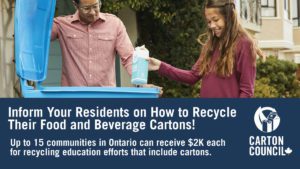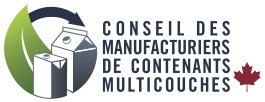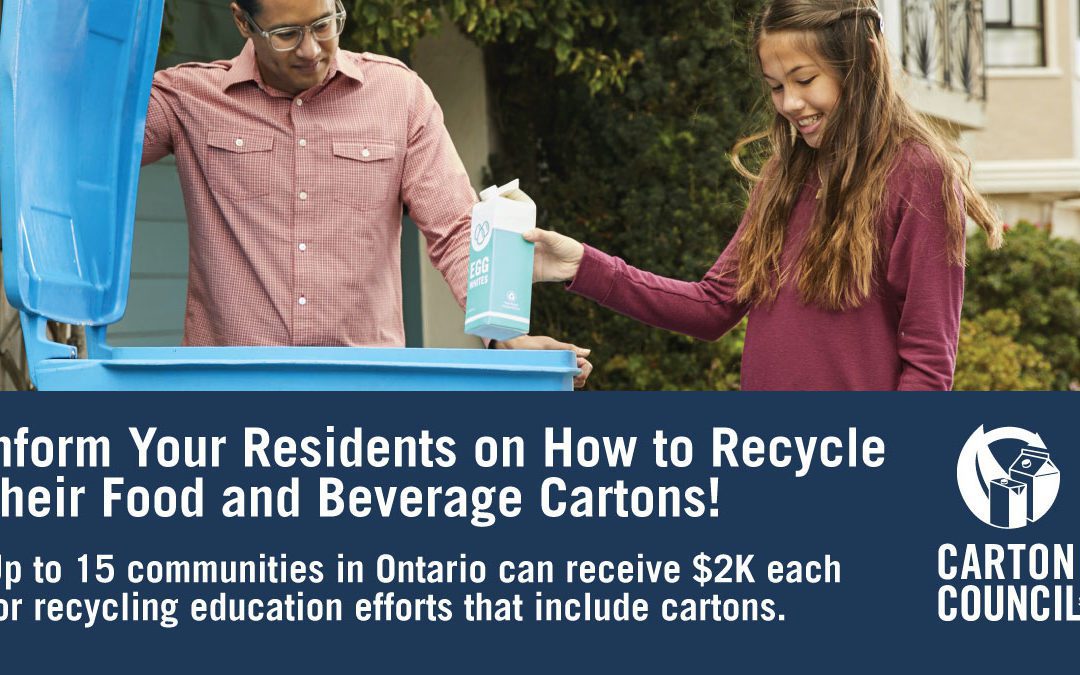

The award was initiated because there is still a great deal of confusion about the recyclability of food and beverage cartons. Research tells us that consumers look first to their local community websites for information about what they can and cannot recycle, so it was important to engage municipalities, services boards, solid waste authorities, and other not-for-profit organizations as potential participants. In addition to promoting recycling in general, it is critical that each organization’s website accurately and clearly defines carton recycling.
We are pleased to share that the following organizations are currently participating in the 2021 Community Education Award:
- Municipality of Dysart et al
- Municipality of Trent Lakes
- County of Wellington
- Township of Nipissing
- Rexdale Women’s Centre – Share and Reuse Spaces (Toronto)
- District of Muskoka
- Township of Southwold
- Town of Carleton Place
- Township of Brudenell, Lyndoch and Raglan
- City of Cornwall
- Township of Drummond/North Elmsley
- Mississippi Mills
- Township of Montague
- Township of Southgate
- Wollaston Township
Continuing the conversation – and the learning
While the program is ongoing until the end of November, there has been an active conversation between CCC and participating organizations. CCC Managing Director, Isabelle Faucher, has been able to read through each of the group’s websites and offer some suggestions on simple changes that can make a significant difference.
For example, according to Isabelle, it’s a good idea to stick with terms that are familiar to a consumer audience. Referring to cartons as “polycoat” isn’t as effective as using the far more common term “food and beverage cartons”. Likewise, being specific about what cartons might contain (e.g., milk, soup, juice, wine, etc.) is very helpful, as are images and illustrations.
At the outset of the community awards program, CCC was also able to host a Web Site Best Practices & Effective Recycling Messaging webinar; slides and a recording (passcode: Km7L4T*d) of that discussion are now available for anyone interested in updating their own online carton recycling information.
The responses from the participants to this feedback has been very positive and many have already shared with CCC the education and communications activities they have implemented.
The review of participants’ web site also revealed that some programs do not currently have effective sorting guidelines for their residents. Based on this, CCC has made available a sorting guideline visual (scroll down to “Generic Recycling Poster”) that we can help customize to individual program needs.
Waste sorting applications
The website review also highlighted the growing popularity of waste sorting applications (“apps”). These interactive digital tools help people identify various materials and if/how they can be recycled.
According to research conducted by Resource Recycling that included 282 recycling programs in Canada and over 3,000 program in the U.S. over the course of 2020-2021, Canadians are more likely to use search tools and apps than our US counterparts. In fact, 28% of the programs surveyed used one of the apps, a group which represented 70% of the population in the survey (in contrast, only 9% of US were doing the same).
In combination with other, more traditional educational tools, these apps certainly can support improved recycling outcomes.
Looking ahead – is Quebec next?
As we draw closer to the Community Education Award program’s November 26 submission deadline, we are very much looking forward to seeing the fruits of participants’ efforts. A full article on the program and its outcomes will be featured in CCC’s forthcoming Winter 2021 newsletter, so keep your eye out for more to come.
In the meantime, we are starting to plan for next year and are considering broadening the program’s reach to include Quebec.
To our Quebec-based readers: What do you think of that idea? We’d love to hear from you. If you think the idea is a good one, please reach out to Isabelle and let her know. Updates to follow!


